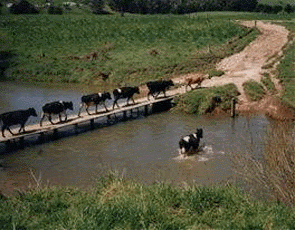
Fonterra has launched a major new initiative designed to bring about a substantial reduction in non-compliance with regional council dairy effluent rules.
The nationwide rollout of the “every farm, every year” program follows a pilot study carried out with Waikato farmers between March and July this year.
Fonterra is checking every farm’s dairy effluent system every year as part of their annual Farm Dairy Assessment.
Systems found to be at risk of non-compliance will be referred to a Sustainable Dairy Specialist who will work with the farmer to develop a remedial plan for action and timeframe for implementation. Fonterra has doubled to 10 its Sustainable Dairying Specialist team to support shareholders in getting compliance right.
A spokesperson for Fonterra, Tim Deane, said “the program is an important step towards bringing down the incidence of significant non-compliance with council effluent rules and forms part of an annual $5 million investment from Fonterra supporting sustainable dairying practices.
"That includes the advice and support given by our Area Managers, our advocacy programme in the policymaking area and specialist support systems like our Sustainable Dairying Specialists."
He said Fonterra’s initiative had been welcomed by regional councils who were keen to partner with the co-operative to improve compliance performance.
Improved results in regions like Canterbury and Auckland showed gains could be made when councils, DairyNZ, farmers and Fonterra worked constructively together.
Deane said the Waikato pilot gave the opportunity to raise awareness for farmers and provide additional training for the assessors responsible for carrying out annual on farm checks. "It’s imperative that both farmers and assessors learn to recognise when an effluent system could be at risk of non-compliance."
Fonterra's specialists visited over 350 farms in the Waikato between March and July on the back of referrals from the pilot programme, the regional council or requests from farmers for advice. In many cases they found that minor changes could be the difference between compliant or at-risk systems.
"Small details like the size of an effluent dispensing nozzle, the speed of an irrigator or good effluent system maintenance could make all the difference in being compliant or not.
"The advantage of doing our every farm, every year checks is we’re now finding and fixing potential issues before they can cause problems down the line and the proactive approach not only helps farmers avoid costly penalties but also helps keep the environment and our streams clean."
The Waikato pilot also highlighted the need for sufficient effluent infrastructure and storage. Farms at risk of non-compliance were already working with a specialist for further support.
"This is exactly what we expected to see and the fact that there are farmers out there who need assistance is why we put the program in place. The important thing is that we’re able to raise the levels of awareness and through education and specialist advice we’re looking to make effluent compliance a complete non issue for Fonterra’s suppliers."

We welcome your comments below. If you are not already registered, please register to comment
Remember we welcome robust, respectful and insightful debate. We don't welcome abusive or defamatory comments and will de-register those repeatedly making such comments. Our current comment policy is here.